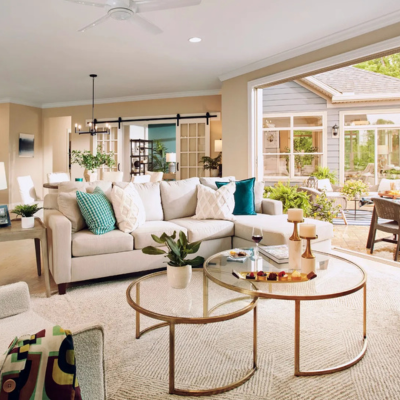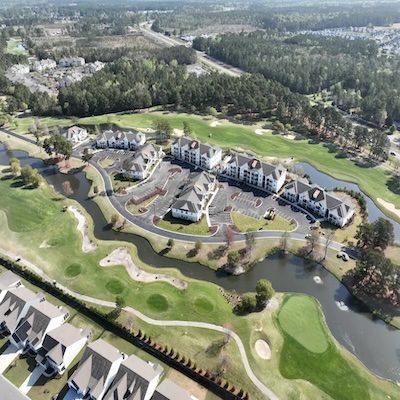What Makes for Great Active Adult Communities
Category: Active adult communities
December 3, 2010 — The sentiment expressed in…”I could have had a V-8!” is relevant to your selection of an active adult community or retirement town: Why settle for an average retirement community when you could live in a really good one? So with that goal in mind we have assembled a list of what we think makes for a great active adult community. We welcome comments and additional criteria, as well as all reader suggested nominations.
Active Community Best Practices
1. Great communication.In our opinion the #1 thing any organization can do is communicate – effectively and openly. Whether it is the HOA or the developer, have some good ways to communicate. Websites, newsletters, agendas, meetings are all great. Agendas for meetings should be published in advance. Minutes of meetings published immediately and prominently.
2. Welcoming resident input. This is related to communication. But some organizations do a much more organized job of soliciting community input. Not just gripe sessions, but structured ways to get constructive feedback and suggestions.
3. Long range planning. Every organization should have some form of long range planning. In an active community that usually comes in the form of facilities planning. Are they looking ahead to plan for road and elevator replacement? Improvements to community facilities like the clubhouse that will help maintain real estate values, but without bankrupting the community? Looking to buy adjacent property if that would help improve property values or expansion possibilities.
4. Policies to insure financial integrity. In the Florida Communities of Excellence Awards contest, The Beach Club of Hallandale Community Association hopes to win an award in the financial category for its pro-active policies to keep delinquent owners from using communal facilities. While it might seem harsh, so are the pains caused by owners who choose not to fulfill their financial obligations to the community. Countless other communities do a great job financially by controlling their expenses, implementing financial controls, and planning for the future.
5. Resident-focused Innovation. Whether the innovation is design inspired, amenity focused, or technologically driven, some communities are head and shoulder above others. Parkview Court in Torrance, CA won an award from the National Association of Home Builders’ 50+ Housing Council in 2010. This 400-unit complex is the anchor of a 20-acre master-planned infill community that not only includes age-restricted housing, but also apartments and townhomes. (Somewhat disappointingly, we find in 2010 that this community has a minimal presence with no website. We were able to find one unit for sale in the complex in the low $200’s). Other communities manage to create just the right mix of amenities that delight their residents.
6. Reasonable rules and policies. Not only doing a good job of formulating the rules of the road, but enforcing them fairly and consistently.
Awards
The National Association of Homebuilders (NAHB) sponsors awards for 50+ Builders. The competition is intense and the judging seems to be very objective.
The 2011 Florida Communities of Excellence Awards are open to all Florida shared communities (condo, homeowners, and cooperative) and there is no cost to enter. For more information call 305 529-1944 or visit http://www.communitiesofexcellence.net.
What Do You Think? Please share your ideas for what makes for makes for an award winning community in the Comments section below. And if you have some nominees, lets hear about them.
For further reference:
The 100 Most Popular Active Communities at Topretirements for 2011
Best 50+ Community Awards at NAHB
What Makes for a Great Community
December 4 Newsletter: Award Winning Communties






Comments on "What Makes for Great Active Adult Communities"
Jan Cullinane says:
Good list. It's also important as we age to consider the larger community (town/city) as well. As examples, many are increasing lettering on street signs, allowing longer times at crosswalks, making roads more pedestrian-friendly, and designing one-stop shopping for issues related to aging.
Jan Cullinane, co-author, The New Retirement: The Ultimate Guide to the Rest of Your Life (Rodale)
says:
Any suggestions on the best way to see if a community or HOA excels in these criteria? (Other than spending time in the community ...). I'd like to learn if there are online resources to evaluate a community before I spend time and money visiting.
Betty says:
Great summary of what really makes a great retirement community! I would add great location to your list.
Shirley Kappa says:
Having just returned to my home in Colonial Heritage (Williamsburg, VA) after 2 weeks in the hospital for a double hip replacement surgery...a key thing to look for is a community where people band together to take care of their neighbors. Our community puts out an email to the block captains letting them know if someone is ill, has suffered a loss, or needs help...and they all turn out. It's a great communications network! I had neighbors I never met come visit me at the hospital. My two nearest neighbors kept an eye on my house and yard. Others took care of my pets, and now they are all showing up to see if they can drive me somewhere, cook me a meal or help in any way. It's nice to know that I'm in a community where neighbors look out for one another!
A. Nihilist says:
Great communities do not dictate/evaluate virtually every move a resident makes. In fact, the best communities have the fewest rules, only those that actually make sense to the residents as a whole rather than taking care of a handful of insiders who want to control the place.
Mad Monk says:
For some of us, I guess the definition of a "great community" in which to spend our remaining years differs from that of A. Nihilist. Of course, if Mr/Ms Nihilist stands true to that moniker s/he would not want to live in ANY "community," but rather be alone on a mountain top or deserted island. Heck, even we Mad Monks like our "monasteries." When one enters a "community," rules help keep us "civilized." That is why some of those "free-form" Hog Farms of the 60s (our boom years) failed one after the other.